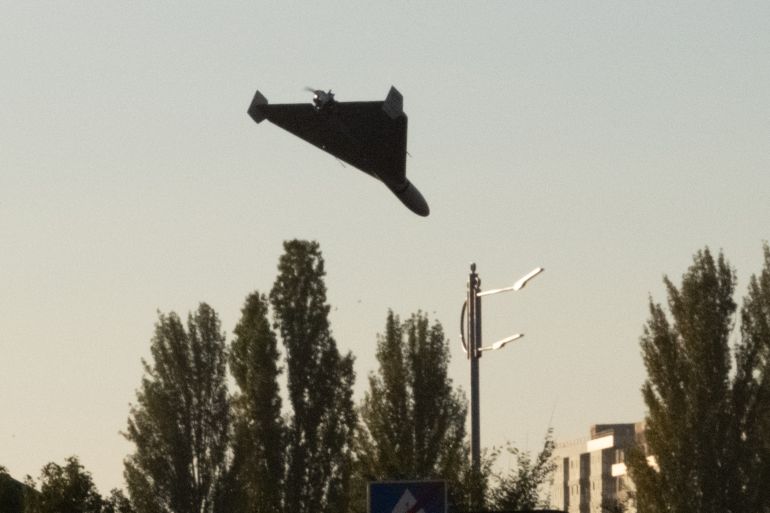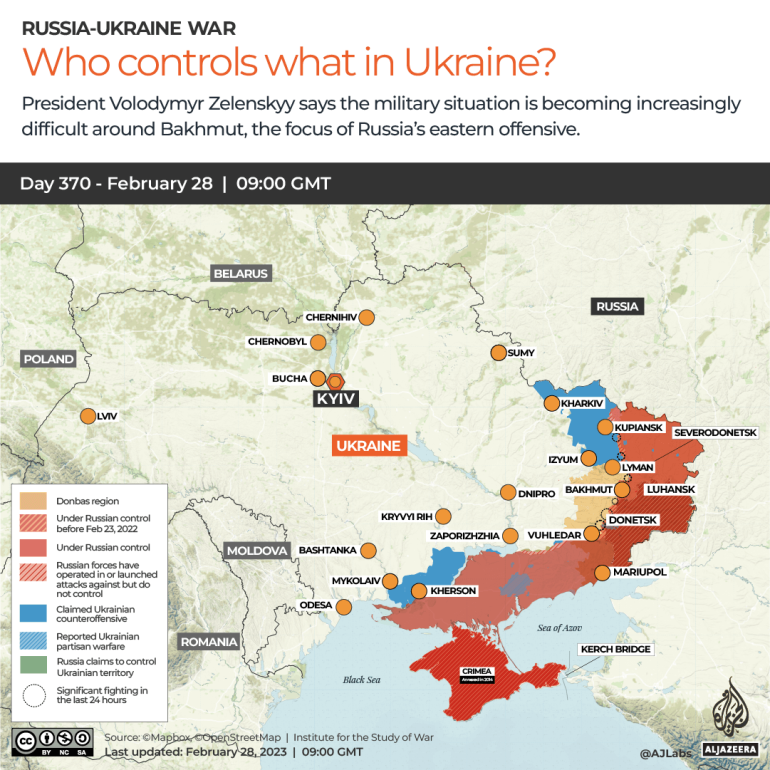Month: February 2023
The Ultimate Infantry Rifle – M468
Putin orders tightening of Ukraine border as drones hit Russia

Published On 28 Feb 202328 Feb 2023
Russian President Vladimir Putin has ordered officials to tighten control of the border with Ukraine after a spate of drone attacks that Russian authorities blamed on Kyiv delivered a new challenge to Moscow a year after its full-scale invasion of its neighbour.
One drone crashed on Tuesday just 100km (60 miles) southeast of Moscow in an alarming development for Russian defences.
While Putin didn’t refer to any specific attacks in a speech in the Russian capital, he stepped up border controls hours after drone attacks targeted several areas in southern and western Russia and authorities closed the airspace over St Petersburg in response to what some reports said was a drone.
Also on Tuesday, several Russian television stations aired a missile attack warning that officials blamed on hacking.

The drone attacks caused no casualties but provoked a security stir after the war in Ukraine marked its first anniversary last week.
Ukrainian officials did not immediately claim responsibility for the attacks, but they similarly avoided directly acknowledging responsibility for previous strikes and sabotage while emphasising Kyiv’s right to hit any target in Russia after Moscow launched its full-scale invasion of Ukraine.
No drone damage
A flurry of drone attacks on Monday night and Tuesday morning targeted regions inside Russia along the border with Ukraine and deeper into the country, according to local Russian authorities.
A drone fell near the village of Gubastovo, 100km (60 miles) southeast of Moscow, Andrei Vorobyov, governor of the region surrounding the Russian capital, said in a statement.
The drone didn’t inflict any damage, Vorobyov said. He didn’t describe the drone as Ukrainian but said it likely targeted “a civilian infrastructure object”.
Pictures of the drone showed it was a Ukrainian-made type. It reportedly has a range of up to 800km (nearly 500 miles) but isn’t capable of carrying a large load of explosives.
Russian forces early on Tuesday shot down a Ukrainian drone over the southwestern region of Bryansk, Governor Aleksandr Bogomaz said in a Telegram post. He said there were no casualties in the incident not far from the Ukrainian and Belarusian borders.
Local authorities reported that three drones also targeted Russia’s Belgorod region on Ukraine’s border on Monday night with one flying through an apartment window in its capital, also called Belgorod. It is 80km (50 miles) north of the Ukrainian city of Kharkiv. Governor Vyacheslav Gladkov said the drones caused minor damage to buildings and cars but no casualties.
The Russian Ministry of Defence said Ukraine used drones to attack facilities in the southern region of Krasnodar and neighbouring Adygea. It said the drones were brought down by electronic warfare assets, adding that one crashed into a field and another diverted from its designated flight path and missed an infrastructure facility it was supposed to attack.
SOURCE: THE ASSOCIATED PRESS
ALJAZEERA.COM
WRC (WILDLIFE RANGER COURSE) MARCH 2023. SPECIAL OFFER!
NOW 500 EUROS, LIMITED TIME OFFER!

Pakistan delivers tough message to Afghan Taliban over rising ‘cross-border attacks’
Islamuddin Sajid

ISLAMABAD
Pakistan has warned the interim Afghan Taliban administration that if terrorists involved in cross-border attacks in the country are not eliminated, Islamabad would take action against them within Afghanistan, an official said on Friday.
A high-level Pakistani delegation led by Defense Minister Khawaja Asif delivered this message to Afghanistan’s acting Deputy Prime Minister Mullah Abdul Ghani Baradar during his day-long visit to Kabul on Wednesday.
Asif was accompanied by Lieutenant General Nadeem Ahmed Anjum, the head of the country’s premier intelligence agency, Inter-Services Intelligence (ISI), and other senior officials from the defense and foreign ministries.
“Our delegation delivered a very loud and clear message to Afghan Taliban leadership to stop Afghanistan-based militants of the Tehreek-e-Taliban Pakistan (TTP) from launching any spring offensive inside Pakistan and eliminate them from Afghan soil,” a senior security official told Anadolu on condition of anonymity as he was not authorized to speak to the media.
“In case of failure to stop the TTP from cross-border attacks and does not take any action to eliminate them or expel them from their hideouts, then Pakistan has no other choice except to target their hideouts in border areas inside Afghanistan,” said the official, who claimed to be well aware of the meeting’s details.
In response, the official claimed that Baradar denied the presence of TTP, a conglomerate of several militant groups in Pakistan that Islamabad believed were currently inside Afghanistan.
Later, the meeting was also joined by acting Afghan Interior Minister Sirajuddin Haqqani and acting Defense Minister Mullah Mohammad Yaqoob, where Yaqoob took the matter of the drone attack carried out by the US last year in Kabul, according to the official source.
In August 2022, US President Joe Biden announced that his forces had killed al-Qaeda chief Ayman al-Zawahiri in a drone strike, which the Taliban interim administration refused to accept openly.
The Afghan officials alleged that the US launched the attack while using Pakistani airspace, but Islamabad rejected the claim, saying the US was never allowed to use its airspace against Afghanistan.
Taliban officials also insisted that the TTP has no presence in Afghanistan, with all of its leadership having relocated to Pakistan following the Taliban’s takeover of Kabul in August 2021.
“We showed them proof of how TTP planned and carried out recent attacks in Bannu and Peshawar from Afghanistan and warned them that any further attack would result in a tough response from Pakistan,” the security official said.
He was referring to the Bannu counter-terrorism facility, which was taken over by TTP militants for three days in December last year, killing at least two security personnel before the Pakistan Army killed all of the terrorists in an operation.
Over 100 people, mostly police officers, were also killed in a suicide bombing at a mosque inside a police compound in northwestern Peshawar late last month.
When asked about the expected Pakistani response in the event of an attack, the official said, “We have no other option but to target militants’ hideouts in border areas inside Afghanistan.”
“We have delivered this message to them,” he added.
Tensions between the two neighbors rose after the Taliban removed border fencing at some points along the Pakistan-Afghanistan border, resulting in an increase in TTP terrorist attacks inside Pakistan in recent months.
Previously, Pakistan was believed to have some influence over the Afghan Taliban, and their return to power was seen as a major strategic victory for Islamabad. However, relations between the two countries have deteriorated in recent months.
Baradar was one of the top commanders who had reportedly spent years in the captivity of Pakistani forces before being released to lead the Taliban delegation in the landmark Doha talks in 2020, which cleared the way for the re-capture of Afghanistan.
The Afghan Information Ministry in a statement later said the two sides discussed “bilateral relations, trade, economic cooperation, and security matters” during the meeting.
Baradar urged Islamabad to facilitate all Afghan travelers at the Torkham and Chaman borders, as well as to provide special facilities for patients in need of emergency treatment.
He also called for the release of Afghan nationals incarcerated in Pakistani jails, mainly for illegally entering Pakistan.
Kabul wanted to strengthen trade and economic ties with Islamabad, he said, stressing the importance of “fraternal relations” between the two neighbors.
He insisted that trade and economic issues should not be separated from politics and security.
The Pakistani delegation also promised to resolve these issues.
aa.com.tr
